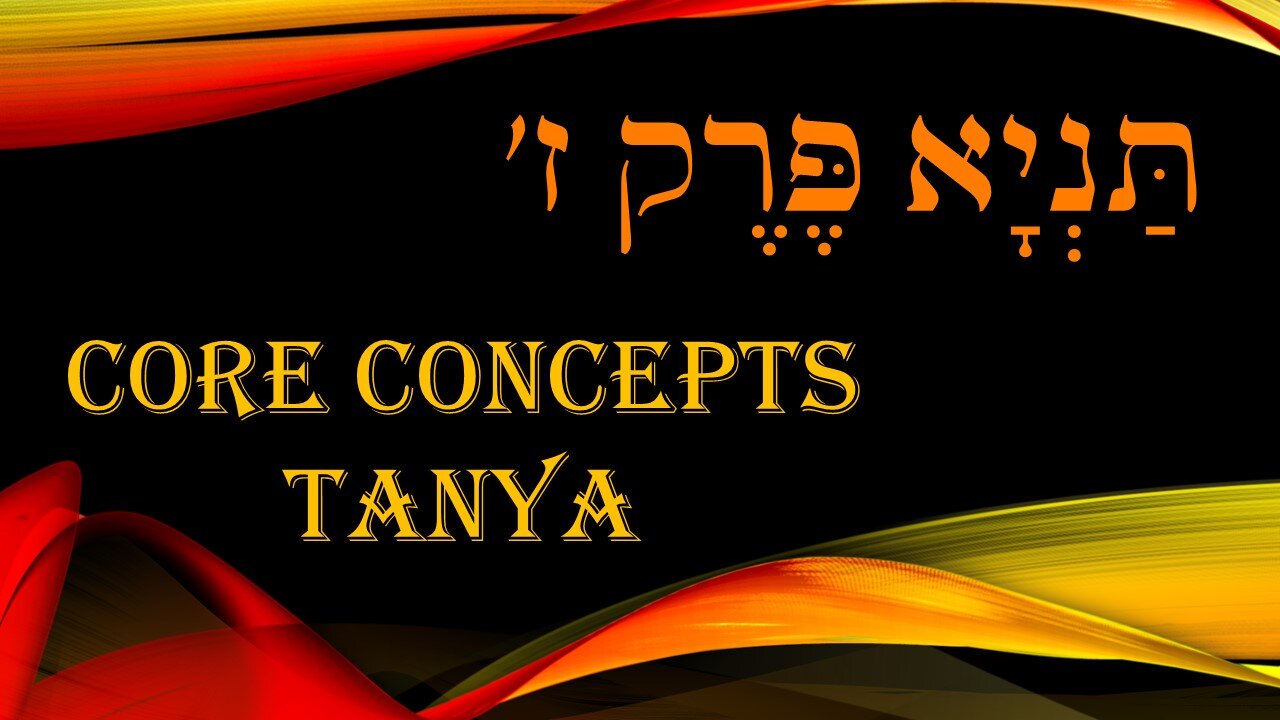Premium Only Content

Core Concepts Tanya: Chapter 7
Brief Recap of Chapter 7:
1. Chapter 7 picks up where Chapter 6 left off in discussing the two levels of "Klipah."
Klipas Nogah includes all things that are permissible, mundane actions that have the potential for holiness.
Shalosh Klipos Hatme'os, the Three Impure Klipos, includes anything forbidden and contains no element of good whatsoever. These are not only evil, but also anything which is forbidden, for the simple reason that Hashem says this is not how we bring holiness into the world.
2. The world we live in is called the World of Asiyah, the world of action.
From all the worlds, this is the only physical world, the world in which Torah can be kept and Mitzvot can be performed.
However, in this world, the negative elements, even evil elements, often overshadow the good, or the potential for good in this world.
It is our mission to extract that good and elevate it to holiness.
3. In regard to mundane acts that can be elevated, we use two main examples.
One is eating. The actual act of eating is neutral, but it can become good or bad depending on our intentions when eating.
If we eat to keep our bodies healthy, to nourish ourselves so that we can fulfill our purpose in this world, so that we can be at our best, then this act of eating is elevated.
If we eat simply to indulge ourselves, if we give in to gluttony, then we degrade the act of eating. It's the difference between eating to live and living to eat.
The second example is in making a joke.
Do we make jokes just to waste time, mock, and give in to frivolity, or do we joke to relax and open our minds to learning new things?
The two examples highlight our goal to even subconsciously train ourselves to dedicate our actions to G-d.
When we think that our actions are all for a higher purpose, be it going to work, exercising, painting, whatever, we elevate even the simplest of actions.
4. The world for forbidden things is "Assur." The word for permitted things is "Mutar."
Assur doesn't mean forbidden, but bound, because the energy within a forbidden act is bound and trapped by the "Sitra Achra," the "Other Side."
Mutar means unbound, because when we use a mundane object for something good, we untie and elevate the Divine energy in that object.
5. The word "Teshuvah," what we usually translate to mean repentance, comes from the word of return, as in bringing ourselves closer to our Heavenly source.
6. This chapter ended with discussing the power of saying the nighttime Shema, likening it to a double-edged sword against the forces of the "Other Side." It also spoke about the holiness, and greatest, Divine gift we have in our ability to create life, and what it means to belittle that opportunity.
-
 LIVE
LIVE
Man in America
3 hours agoIs $140K the New Poverty Line? Is This the End of America’s Middle Class?
6,343 watching -
 LIVE
LIVE
Dr Disrespect
7 hours ago🔴LIVE - DR DISRESPECT - THE GAME AWARDS 2025 - WORLD PREMIERES AND WINNERS
2,688 watching -
 LIVE
LIVE
Laura Loomer
2 hours agoEP161: Oh Brother! Ilhan Under Investigation For Immigration Fraud??
965 watching -
 LIVE
LIVE
Akademiks
2 hours ago21 Savage x Big Bank interview Reaction. 21 savage album drops at midnight.
1,073 watching -
 2:38:47
2:38:47
TimcastIRL
3 hours agoErika Kirk Tells Candace Owens STOP, Candace Says NO | Timcast IRL
230K153 -
 LIVE
LIVE
Alex Zedra
2 hours agoLIVE! New Game | Cursed Companions
138 watching -
 52:12
52:12
T-SPLY
1 hour agoMembers of Congress MELTDOWN Over Federal Agents and Arrests!
3.75K3 -
 2:45:28
2:45:28
Barry Cunningham
4 hours agoLIVE BREAKING NEWS: President Trump Speech at the Congressional Ball | AlphaWarrior Interview
30K14 -
 LIVE
LIVE
DLDAfterDark
2 hours agoDan Crenshaw Suing Shawn Ryan - Gun Talk With A Stranger - 300BLK VS 556 for PDW
301 watching -
 DVR
DVR
Flyover Conservatives
22 hours agoWhat Happens When Muslims Hit 10% of a Country? The Tipping Point No One Will Talk About - Dan Burmawi | FOC Show
12.1K10